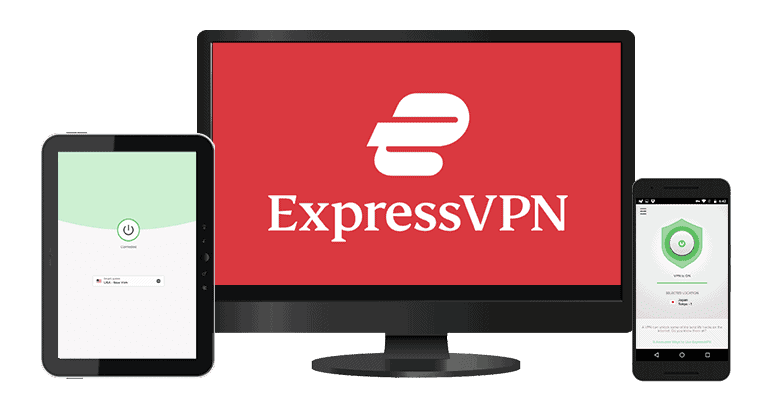
Updated on: December 5, 2024
Short on time? Here’s the best NordVPN alternative for China in 2024:
- 🥇 ExpressVPN : Includes obfuscated servers that consistently work in China. Comes with industry-leading security features to protect your online traffic in China and maintains super-fast speeds. It also has a large server network, with lots of servers near China, and all plans are backed by a 30-day money-back guarantee.
Unfortunately, NordVPN doesn’t work in China. Even though it has obfuscation, which hides your VPN traffic and helps you use the VPN in censorship-heavy regions, its support reps don’t recommend trying to use the service in China.
Even so, I’ve compiled a list of some troubleshooting steps that may help you connect in China with NordVPN. As a backup, you’ll also find a list of recommended VPNs that work reliably in China.
My favorite is ExpressVPN, which consistently works in China and other restrictive countries without any issues. Editors' Note: ExpressVPN and this site are in the same ownership group.
How to Use NordVPN in China
NordVPN doesn’t work in China, but if you already have a NordVPN subscription and want to try to make it work, here’s what you can try:
- Download and install the VPN app onto your device. Ideally, you should do this before you arrive in China because NordVPN’s website may be blocked in the country. If you’re already in China, you can try contacting NordVPN’s customer support team to ask for a mirrored link to their website at this email address: support@nordvpn.com.

- Change your VPN protocol to OpenVPN. You can’t connect to NordVPN’s obfuscated servers unless you’re using the OpenVPN protocol — it’s best to connect to Open VPN (TCP), which works better in restrictive countries. To do so, navigate to the Settings menu, click on Connections, and find the VPN protocol setting. This shouldn’t be an issue and you can skip this step if your VPN protocol is set to Automatic (Recommended).

- Find NordVPN’s obfuscated servers. Return to the home screen and find its obfuscated servers under Specialty servers.

- Connect to an obfuscated server. Choose a location in a nearby country for the fastest possible speeds, or allow NordVPN to choose the fastest server for you to automatically and press Connect.

Learn more about NordVPN in our full review
NordVPN Not Working in China? Try These Troubleshooting Steps
If you’re still having issues connecting to NordVPN’s servers, here are some troubleshooting tips you can try:
- Ensure that you’re connected to an obfuscated server.

- Switch VPN servers.

- Clear your web browser’s cookies and cache.

- Contact NordVPN support.

- Try a different VPN.
If all else fails, you can try a different VPN. The ones I recommend below are tested and proven to work reliably in China.
Best NordVPN Alternatives That Work in China in 2024
Quick summary of the best NordVPN alternatives that work in China:
- 1. 🥇ExpressVPN — Best NordVPN alternative that works in China (excellent obfuscation).
- 2. 🥈Private Internet Access — Customizable VPN apps to access the free web in China.
- 3. 🥉PrivateVPN — Intuitive VPN for China with good security (great for beginners).
DISCLAIMER: This article is only for informative purposes and should not be taken as legal advice. VPN usage in China is a legally gray area, so I strongly recommend researching the local laws of the region you’re in to make sure you don’t risk facing any legal repercussions for using a VPN.
🥇1. ExpressVPN — Best VPN for China
ExpressVPN is my #1 NordVPN alternative for China. Its obfuscation is available on all servers and protocols (most VPNs only offer obfuscation on the OpenVPN protocol only); this makes your VPN traffic look like regular traffic, so it’s harder for the Chinese monitors to detect and block you.
A major reason why ExpressVPN works so reliably in China is that it refreshes its server IP addresses very frequently on all servers, which makes it difficult for the Chinese government to block them. Another reason is that ExpressVPN uses TCP port 443, which is almost impossible to block because it’s the same port used by almost all secure non-VPN internet traffic.
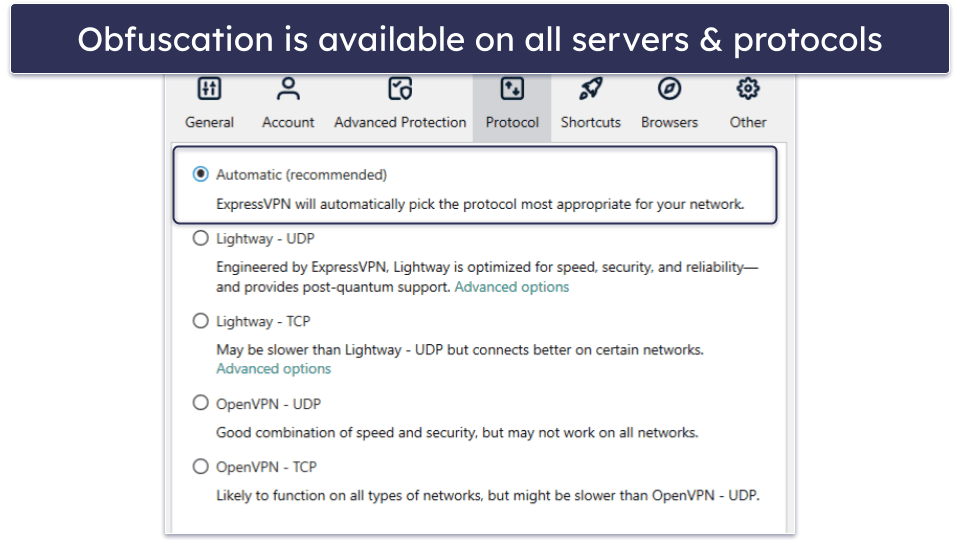
I’m a fan of ExpressVPN’s browser extensions for Chrome and Firefox for China. They prevent HTML5 geolocation from revealing your real location by making sure your browser’s location data matches your VPN server location.
This provider has servers in 105 countries, including nearby servers in Hong Kong, Japan, and Singapore for the fastest possible speeds. However, there are specific servers that it recommends for use in China, which offer the best chance of connecting. ExpressVPN’s support reps also recommend using the Automatic protocol setting in the country.
ExpressVPN works with all 100+ streaming sites, including lots of popular ones like Netflix, Amazon Prime, and Disney+, and it has an excellent split-tunneling feature, so you can access local services and websites in China in one browser while your other apps use the VPN for access to a free and open web.
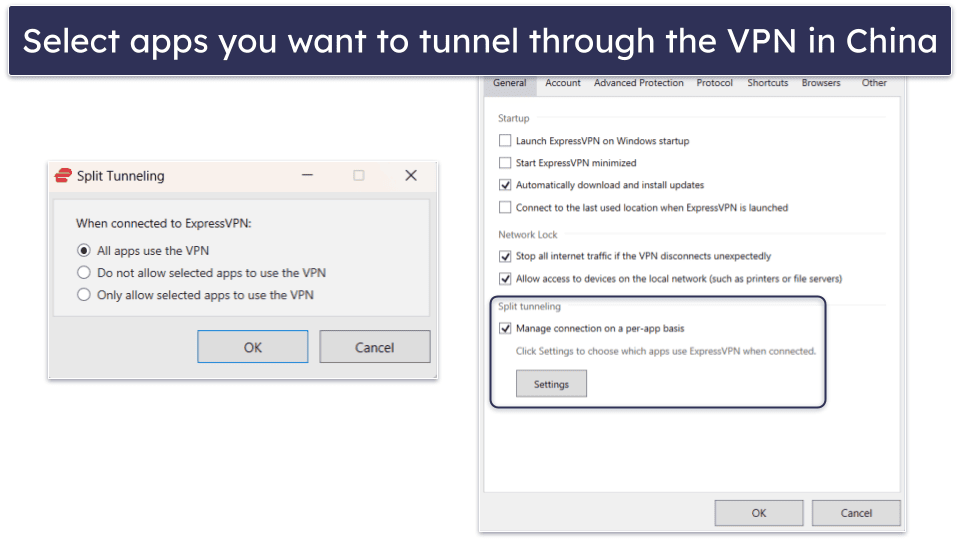
The VPN also has top-notch customer support for China. All of its reps are super knowledgeable and available 24/7 via email support and live chat in case you need help connecting in China.
ExpressVPN offers several plans, starting at $4.99 / month. This is very affordable, considering that it offers tons of value. Plus, all plans come with a 30-day money-back guarantee, so you can try it risk-free.
Bottom Line:
ExpressVPN is the best NordVPN alternative that works in China. It offers obfuscation on all servers and protocols, so you’ll be able to connect to any server location you want, and it has a large server network with lots of servers near China for the best possible speeds. ExpressVPN is highly secure, can access 100+ streaming sites, and it backs all plans with a 30-day money-back guarantee.
Read the full ExpressVPN review
🥈2. Private Internet Access — Highly-Customizable NordVPN Alternative for China
Private Internet Access (PIA) works well in China thanks to its obfuscation feature, provided via Shadowsocks proxy servers. The proxy servers are located in 6 privacy-friendly countries, including Japan and Switzerland. Please keep in mind you have to manually connect to the Shadowsocks servers (ExpressVPN offers obfuscation on all servers).
My favorite part about PIA is that it allows you to tweak a lot of settings to get the best possible connection when in China. For example, you can change encryption levels and set auto-connections when your device detects unknown Wi-Fi networks. More importantly, PIA allows you to pick port 443 when on the OpenVPN (TCP) protocol for a more reliable connection in China. Every setting comes with helpful explanations too, so you’ll know exactly what it does.
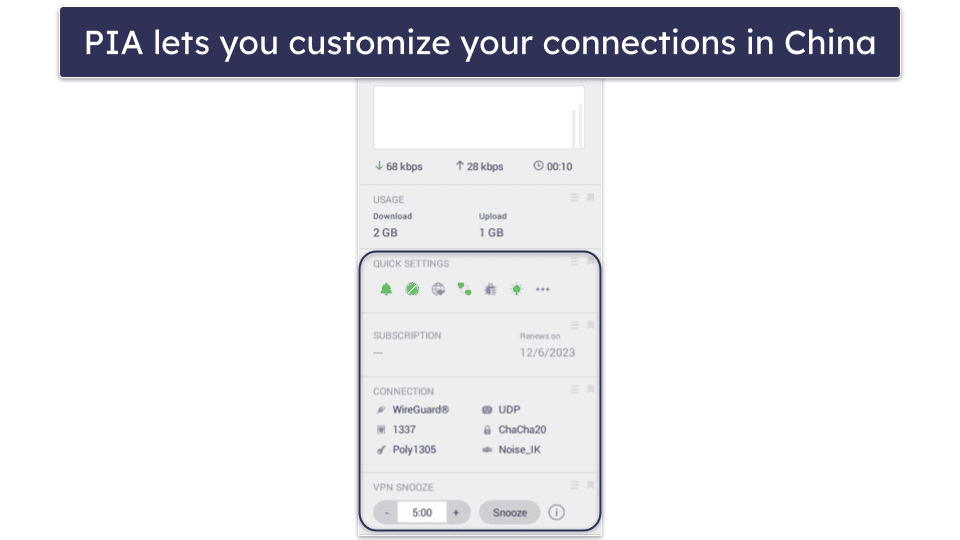
The VPN is great for streaming in China as well — it has streaming-optimized servers, including the US, Japan, and Austria, that work with 5+ Netflix and Amazon Prime libraries, and it works with 30+ streaming sites. Still, ExpressVPN works with more streaming services.
PIA also has 24/7 customer support via live chat and email if you need help connecting to the VPN from China.
Private Internet Access’s plans are cheap, starting at just $2.03 / month. All plans come with a 30-day money-back guarantee.
Bottom Line:
Private Internet Access securely hides all traffic in China and gets around restrictions with its Shadowsocks servers, which are in privacy-friendly nations. It can access lots of top streaming sites, and its apps are highly customizable in case you want to improve your online connection while in China. All plans have a 30-day money-back guarantee.
Read the full Private Internet Access review
🥉 3. PrivateVPN — Beginner-Friendly VPN for China
PrivateVPN is a great NordVPN alternative for VPN beginners in China. It obfuscates traffic with the Stealth VPN protocol, which is super easy to find and enable — simply navigate to the Settings menu, click the Stealth VPN tab, and toggle it on to freely access the internet from China.
You also get servers in 63 countries, which is fewer than ExpressVPN, but I think it’s great that there are servers in nearby locations like Hong Kong, Japan, and Singapore. Its servers access popular streaming services, too, such as Netflix, Max, and Amazon Prime.
I really like its Application Guard feature, which is like a kill switch that shuts down only selected apps if your VPN connection drops. This is pretty convenient because you may only be using the VPN for specific apps in China (such as streaming apps) and don’t need to disrupt all of your online activities in the event that your VPN disconnects unexpectedly. That said, I wish it had a kill switch on its iOS app.
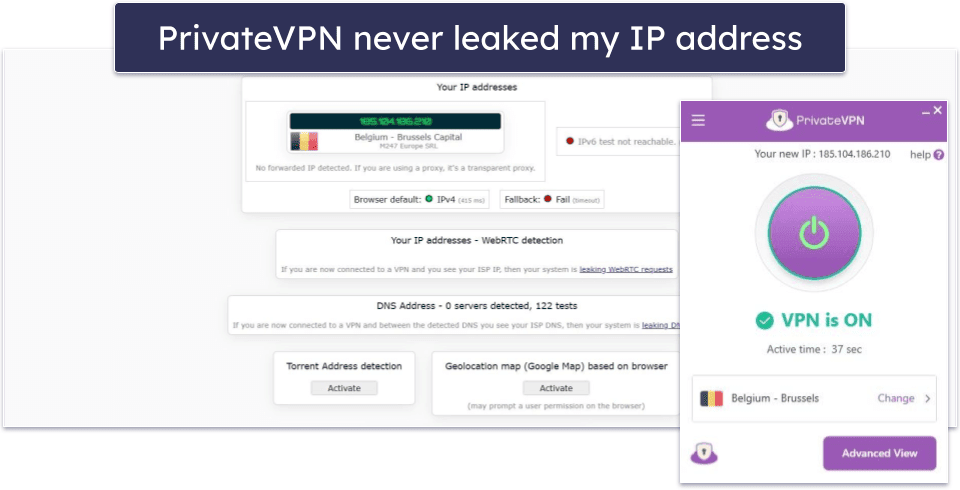
The VPN also has great customer support that you can reach out to any time of day or night if your connection in China isn’t working.
PrivateVPN’s plans start at $2.00 / month, and it backs all plans with a 30-day money-back guarantee.
Bottom Line:
PrivateVPN is a really good pick for beginners who need a VPN in China thanks to its user-friendly apps. It uses the Stealth VPN protocol to disguise your VPN traffic as regular, supports streaming, and has servers nearby China. Its plans are very affordable and offer a 30-day money-back guarantee.
Read the full PrivateVPN review
Editors' Note: Intego, Private Internet Access, CyberGhost and ExpressVPN are owned by Kape Technologies, our parent company
Quick Comparison Table
Editors' Note: Intego, Private Internet Access, CyberGhost and ExpressVPN are owned by Kape Technologies, our parent company
Testing Methodology: Comparison & Ranking Criteria
To find the best alternatives to NordVPN that work in China, I followed SafetyDetectives’s rigorous testing methodology for VPNs. I put my picks through real-world tests to determine that their obfuscation tools work reliably, plus confirmed with customer support that they work in the country. Here’s a breakdown of the exact criteria I used:
- I looked for VPNs that reliably work in China. All VPNs I’ve selected include obfuscation servers or tools, allowing you to freely browse the web in China at any time.
- I considered the security features. Essential VPN security features to look for include 256-bit AES encryption, used by banks and militaries, IP leak protection, a kill switch to disconnect you from the internet when the connection to the VPN server drops, and a strict no-logs policy.
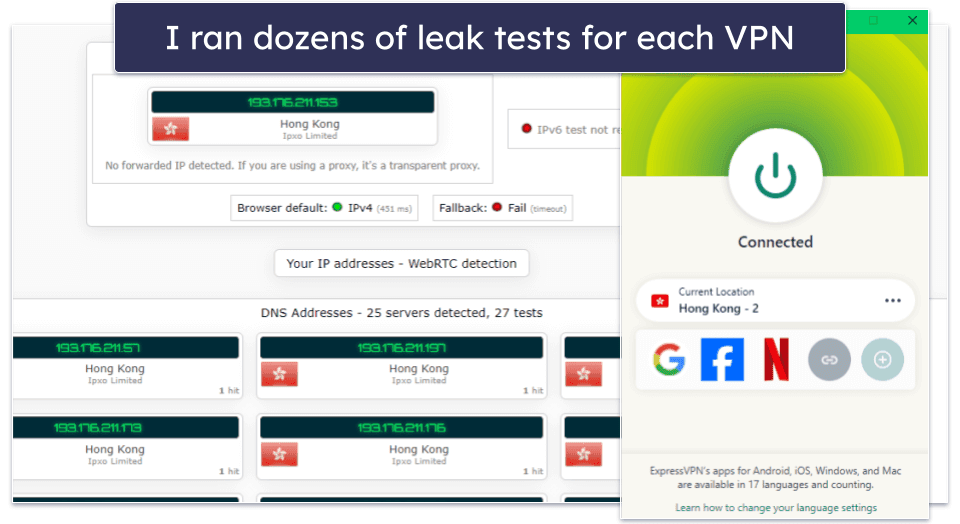
- I tested its obfuscation speeds. While all VPNs slightly reduce speeds due to encryption, and obfuscation may slow it further, I made sure the VPNs on my list still maintain fast speeds — the fastest one in my tests was ExpressVPN.
- I checked the server network. To get the best speeds possible, the VPN should have servers in regions close to China, such as Hong Kong, Japan, Singapore, or Taiwan.

- I only recommend VPNs that provide good value. The VPNs listed here offer affordable plans, support multiple simultaneous connections, and include a money-back guarantee, allowing you to try them risk-free.
Why Does China Try to Block VPNs?
China uses a firewall, often referred to as The Great Firewall, blocking access to popular online platforms, including news sites, streaming services, Google services, and social media sites like Instagram and Twitter. The Chinese government also conducts mass online surveillance by tracking users’ online activities, including which sites they browse.
However, VPN technology allows people in China to bypass online censorship and hide their web traffic. This is why the Chinese government aggressively tries to detect and block access to VPNs — it wants total control over the online content its citizens can view.
Luckily, some top VPNs still work in China, including ExpressVPN. It uses obfuscation technology that makes your VPN traffic look more like regular traffic. This makes it very hard for the Chinese government and its ISPs (Internet Service Providers) to block you.
Is It Legal to Use a VPN in China?
I spent weeks researching this topic, and my conclusion is that this is a gray legal area. Many sources claim that only government-approved VPNs are allowed — though using one would mean the Chinese government could track your VPN traffic. However, I wasn’t able to find information about specific laws that make it illegal to use a non-government-approved VPN.
Many online posts also claim China treats expats and tourists differently than Chinese nationals. Basically, only Chinese nationals are likely to face legal repercussions if they’re caught using non-government-approved VPNs — or if they promote non-approved VPNs on social media sites and messaging apps. I have also seen reports about people being arrested in relation to using VPNs in China — that said, all of those people were operating non-government-approved VPNs.
This is why I recommend researching the local laws before using a VPN in China. It’s the best way to avoid facing legal repercussions if you’re caught using one.
Frequently Asked Questions
Is NordVPN allowed in China?
NordVPN isn’t technically banned in China, but like all VPNs that have a strict no-logs policy and refuse to share any data with the Chinese government, it’s severely restricted in the country — for example, NordVPN’s website is inaccessible from mainland China.
What should I do if NordVPN doesn’t work in China?
You should try another VPN. NordVPN doesn’t work in China, and its customer support reps have told me that it’s not worth trying to make it work, including through manual configuration, in the country.
I recommend using a different VPN like ExpressVPN. All of its apps consistently work in China, it secures your data with industry-leading security and privacy features, maintains the fastest speeds on the market, and comes with excellent streaming and torrenting support.
Can I use NordVPN on iOS and Android in China?
No, as NordVPN doesn’t work in China. Connecting to its servers, even if you perform a manual setup, won’t give you access to the free and open web.
It’s best to use a different VPN. I recommend ExpressVPN because its iOS and Android apps consistently work in China, the apps are easy to use, they have high-end security features, and provide lightning-fast speeds.
Can I use hotel Wi-Fi to access NordVPN’s site in China?
Probably not. I found a couple of sources online that suggest using hotel internet works, but most articles indicate that hotels in China tend to enforce the government-imposed restrictions. If you really need to access NordVPN’s site, I recommend emailing its customer support team to get a mirrored link. You can reach its customer support at this email address: support@nordvpn.com. Even if you do access NordVPN’s site to download the VPN though, NordVPN simply doesn’t work in China.
I recommend opting for a VPN that works in China, like ExpressVPN. This provider has the fastest speeds on the market, offers excellent security and privacy, and has user-friendly apps that are easy to set up and use in China.
Can I use Shadowsocks to connect to NordVPN in China?
No, NordVPN doesn’t support Shadowsocks connections and doesn’t work in China, as confirmed by its support representatives. I also personally tested a manual Shadowsocks connection to a NordVPN server, and unfortunately, it did not work.
If you’re interested in using Shadowsocks with a VPN, I recommend Private Internet Access — it comes with built-in Shadowsocks obfuscation, and it also consistently works in China.
Does NordVPN have servers in China?
No, and the VPN also doesn’t work in China. I instead recommend trying ExpressVPN — it consistently works in China and lets you bypass the government’s firewall by connecting to nearby countries, including Hong Kong, Japan, South Korea, Macau, the Philippines, and Taiwan.
How do I install NordVPN if I’m already in China?
NordVPN doesn’t work in China, but if you want to try and install it anyway, the best way is to use a mirrored link, which are alternative URLs provided by NordVPN. To get a mirrored link, email NordVPN’s customer support team at: support@nordvpn.com. Alternatively, you can try a free proxy service, which may still be unblocked in China, or ask a friend outside of a restrictive country to sign up and send you the VPN setup details.
But, even if you succeed in installing the VPN while in China, it won’t work there — as confirmed by multiple NordVPN customer support reps I talked to. The best alternative is to get ExpressVPN, which consistently works in China and offers really great speeds over obfuscation (which typically really slows down your traffic).
Can I access NordVPN’s website from China?
Unfortunately, access to NordVPN’s website from mainland China is typically blocked due to the country’s internet censorship policies. China’s Great Firewall, a sophisticated system of internet censorship, restricts access to many foreign websites — including most VPN services.
You may still be able to access NordVPN’s website using a proxy or mirrored link, but keep in mind that NordVPN doesn’t work in China. I instead recommend getting a VPN that works there, like ExpressVPN.
